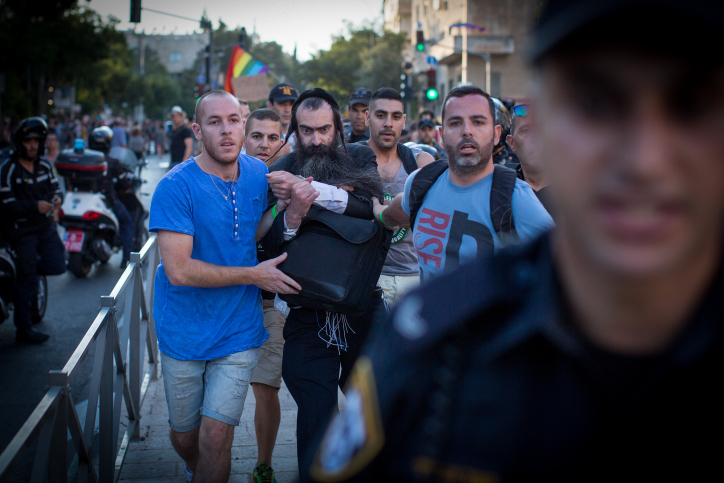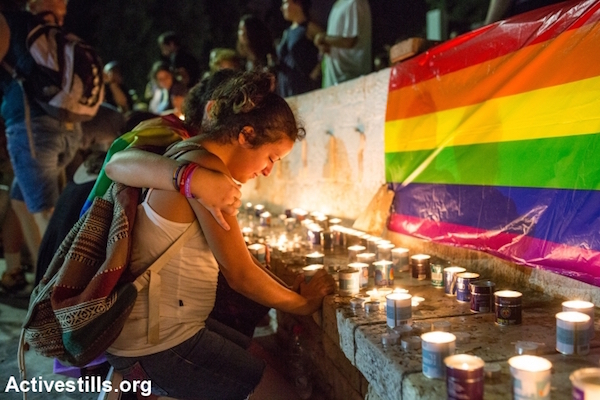As long as Palestinians are deprived of their rights by the occupation, we cannot view the achievements of the Israeli LGBTQ community as an indication of tolerance.
By Noa Bassel

Every year in June, during Pride Month, the inherent paradox built in to Israel’s political discourse reaches a fever pitch: the more oppressed a social group is, the more grateful it is expected to be for those things that are taken for granted by the rest of the population. Palestinians should be grateful that they can attend university, feminists should be thankful to Israel for not living in Iran, Jewish immigrants from Ethiopia should say thanks that they are not in their home country, and LGBTQ people should be grateful that they can walk the streets (illustrative examples in Hebrew can be found here, here, here and here).
These groups are systematically attacked or discriminated against by the police, the legal system, state institutions, and the labor market. Yet they are required to be grateful for their situation, if only because of the comparisons made to imaginary scenarios in which we were born someplace else, all while maintaining the labels that deem us inferior.
The “grateful” discourse is spread by internet trolls, Knesset members, Supreme Court judges, and some members of the LGBTQ community, and is based on several significant contradictions. First, in every struggle we are required to stop fighting and be grateful for what we have already achieved — which we wouldn’t have achieved in the first place had we stopped to say thank you back then. I am certain that queers in the 1970s could have been grateful that the law criminalizing sex between men wasn’t enforced, that one could always lie to their boss and have a same-sex relationship after bringing some children into the world in the comforts of a marriage.
In the past couple of years we have had to explain why we can’t just be gay in the privacy of our homes, and last week the police required the organizers of the pride parade in the city of Kfar Saba to pay for a wall around the marchers “for their own protection.” Luckily, in each of these instances there were brave people around who were unsatisfied; thanks to them, we now stand proud in the face of men in suits who demand that we thank them.
A more complicated contradiction is in the comparison between LGBTQ rights in Israel, the West Bank, and Gaza. First, because those who raise the issue never have to substantiate their claims: they all argue that homosexuals are being thrown off rooftops. But if you try to figure out just how many gay people have been murdered in Gaza, and under which circumstances, you’ll find it very difficult. The official position of Israel, as stated here (Hebrew), is that LGBTQ individuals are not systematically persecuted in the West Bank.
The status of LGBTQ people in Palestinian society is far from perfect, but is is not the business of those who raise the issue as a means of silencing criticism of Israel’s actions. Furthermore, if we look at it from the viewpoint of Israeli LGBTQs, the claim that Palestinian or Muslim society is inherently more homophobic than Jewish society seems like a crude generalization. In both societies one can find forces that accept LGBTQs and those who oppose them. Both sides have organizations fighting for LGBTQ rights. Religious elements threaten the community on both sides. The LGBTQ movement in Israel has faced violence, resistance, and difficulties — just like its Palestinian counterpart.

Unfortunately, Israeli parents still kick their queer children out of the house, and LGBTQs and their supporters are still being attacked. The violent assault on a transgender women in Tel Aviv, the two stabbing sprees by Yishai Schlissel at the Jerusalem Pride March, and the fatal shooting at a LGBTQ youth center, are just some examples (others do not get media coverage).
Every member of the community has had a violent encounter, or at the very least faced verbal harassment in the street. Israeli minors are still being sent to conversion therapy (last year, the Knesset voted against a law that aimed to prohibit this dangerous practice). Just last week, the vice president of Liberia — who promoted legislation to make homosexual relations a first degree offense punishable by 10 years in prison — visited Israel as a guest of the Ministry of Foreign Affairs.

The relative openness we find among the Israeli public today is the result of a continuous struggle by our community members. But there is also a crucial difference between the situations of LGBTQ people on both sides of the fence: those on the Israeli side enjoy freedom of movement; more free time and income; and better access to higher education and information that allows them to continue the struggle. These rights are being deprived of Palestinian LGBTQs by the State of Israel.
Therefore, one cannot look at the achievements of the community in Israel — which were won without the same oppression that LGBTQ Palestinians face in the West Bank and Gaza — as an indication of Israeli tolerance and pluralism. Our job as an inclusive community is to resist these views, and continue to demand no less than equal rights for everyone.
Noa Bassel is a linguistics student and a social activist. This article was first published in Hebrew on Haokets. Read it here.

